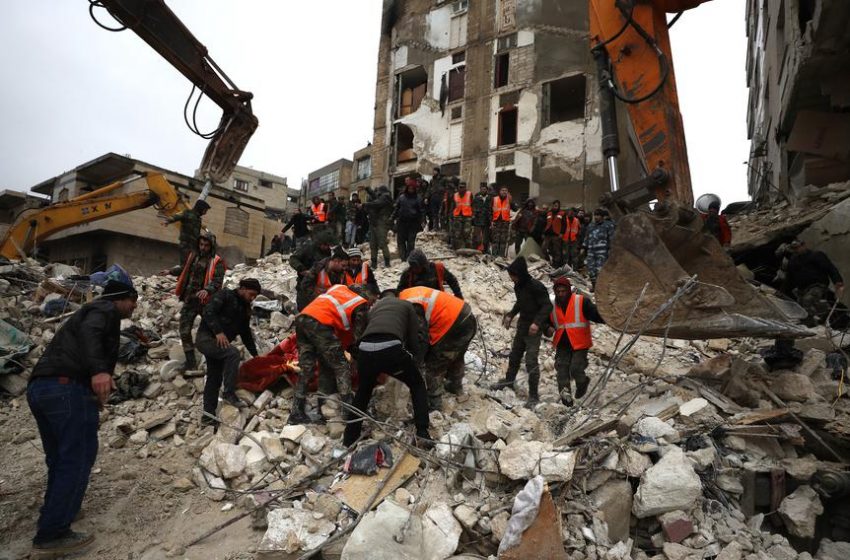Death toll from Syria-Turkey quake nears 10,000 as survivors spend second night in freezing cold

KAHRAMANMARAS/ANTAKYA, Turkey Families in southern Turkey and Syria spent a second night in the freezing cold on Wednesday as overwhelmed rescuers raced to pull people from the rubble two days after a massive earthquake that killed more than 9,600 people.
In Turkey, dozens of bodies, some covered in blankets and sheets and others in body bags, were lined up on the ground outside a hospital in Hatay province.
Many in the disaster zone had slept in their cars or in the streets under blankets, fearful of going back into buildings shaken by the 7.8 magnitude tremor – already Turkeys deadliest since 1999 – that hit in the early hours of Monday.
Rescuers there and in neighbouring Syria warned that the death toll would keep rising as some survivors said help had yet to arrive.
Where are the tents, where are food trucks? said Ms Melek, 64, in the southern Turkish city of Antakya, adding that she had not seen any rescue teams.
We havent seen any food distribution here, unlike previous disasters in our country. We survived the earthquake, but we will die here due to hunger or cold.
With the scale of the disaster becoming more apparent, the death toll rose above 7,100 in Turkey. In Syria, already devastated by 11 years of war, the confirmed toll climbed to more than 2,500 overnight, according to the Syrian government and a rescue service operating in the rebel-held north-west.
Turkish President Recep Tayyip Erdogan has declared a state of emergency in 10 provinces. But residents in several damaged Turkish cities have voiced anger and despair at what they said was a slow and inadequate response by the authorities.
Mr Erdogan, facing a close-fought election in May, is expected to visit some of the affected areas on Wednesday. Embed Instagram Instagram URL View this post on Instagram
A post shared by The Straits Times (@straits_times) Most aid to Syria flows through Damascus, the capital, which is in government-held territory.
Syrian President Bashar Assads government tightly controls what aid goes to opposition-held areas, making cross-border aid deliveries from Turkey a lifeline for the opposition-held areas in the north.
The only United Nations-approved crossing for aid between Syria and Turkey was closed because of earthquake damage, UN officials said.
However, hopes that aid could reach rebel-controlled areas by other routes were piqued by a statement on Tuesday from Syrias Foreign Minister Faisal Mekdad.
Pleading for international support on Lebanese TV, he said his government was ready to allow aid for quake victims to enter all regions, provided the aid did not reach armed terrorist groups. Remote video URL The initial quake, followed hours later by a second one almost as powerful, struck just after 4am on Monday, giving the sleeping population little chance to react.
It toppled thousands of buildings, including hospitals, schools and apartment blocks, injured tens of thousands, and left countless people homeless in Turkey and northern Syria.
The Turkish authorities say some 13.5 million people were affected in an area spanning roughly 450km from Adana in the west to Diyarbakir in the east broader than the distance between Boston and Philadelphia, or Amsterdam and Paris.
In Syria, it killed people as far south as Hama, some 100km from the epicentre.
Turkeys disaster management agency said the number of injured was above 38,000. Remote video URL Under the rubble
In the town of Jandaris in northern Syria, rescue workers and residents said dozens of buildings had collapsed.
Standing around the wreckage of what had been a 32-apartment building, relatives of people who had lived there said they had seen no one removed alive. A lack of heavy equipment to remove large concrete slabs was impeding rescue efforts.
Rescue workers have struggled to reach some of the worst-hit areas, held back by destroyed roads, poor weather and a lack of resources and heavy equipment. Some areas are without fuel and electricity.
Aid officials voiced particular concern about the situation in Syria, where humanitarian needs were already greater than at any point since the eruption of a conflict that has partitioned the nation and is complicating relief efforts. Supplies for a US urban search andrescueteam from Fairfax County, Virginia, being loaded onto a transport plane for a flight toTurkey. PHOTO: US AIR FORCE The head of the World Health Organisation has said the rescue efforts face a race against time, with the chances of finding survivors alive slipping away with every minute and hour.
In Syria, a rescue service operating in the insurgent-held north-west said the number of dead had climbed to more than 1,280 and more than 2,600 were injured.
The number is expected to rise significantly due to the presence of hundreds of families under the rubble more than 50 hours after the earthquake, the rescue service said on Twitter.
Overnight, the Syrian health minister said the number of dead in government-held areas rose to 1,250, the state-run al-Ikhbariya news outlet reported on its Telegram feed. The number of wounded was 2,054, he said.
Turkeys deadliest earthquake in a generation has handed Mr Erdogan a huge rescue and reconstruction challenge, which will overshadow the run-up to the May elections, already set to be the toughest of his two decades in power.
The vote, too close to call, according to polls before the quake, will determine how Turkey is governed, where its economy is headed and what role the regional power and Nato member may play to ease conflict in Ukraine and the Middle East. REUTERS More On This Topic Syrian newborn pulled alive from quake rubble with umbilical cord still attached SCDF to send 20-man team to aid in Turkey quake rescue efforts; Red Cross pledges over $132k









